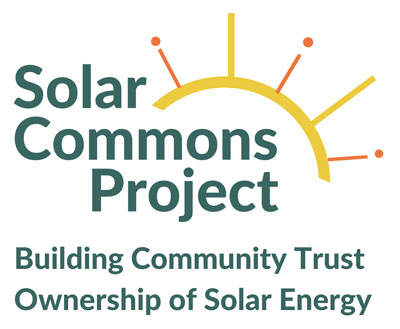
Distributive Justice: Solar Commons reduces greenhouse gases and integrates climate mitigation into a moral context and economy.
Overview
The current fossil fuel energy system creates enormous wealth for some, smaller benefits for others, and disaster for our common home, the earth. The energy transition to cleaner sources is underway causing major shifts in production, distribution, and energy economic systems. But, without new energy economic models, this transition could extend these inequities rather than correct them. The Solar Commons Project offers two new policy opportunities that make our energy transition a more just one: a “Commons Option” where grid owners can pay their public right-of-way franchise fees directly to communities by purchasing clean electricity from Solar Commons arrays delivering local community benefits in social wealth funds; and a Common Wealth Rent Solar structured as a solar/community adaptation of the current “Alaska Permanent Fund” which pays dividends to state residents from state energy licenses).
Policies for socio-cultural energy technologies
A just energy transition assures that the benefits of the massive move from fossil fuels to renewable energy infrastructure are equitably distributed. To do this, energy infrastructure must be understood as socio-cultural technology, that is to say as energy hardware that has economic, ethical, cultural and livelihood dimensions and impacts. The Solar Commons Project makes two new policy contributions to a just energy transition by viewing solar energy a complex socio-cultural technology which policy-makers can design rules for in the following ways:
- A “COMMONS OPTION” ON GRID FRANCHISE FEES: Policymakers can use Solar Commons as a tool of distributive justice in the franchise agreements they hold with private utilities. State, county and municipal officials can require that a percentage of their right-of-way used for transmission and distribution grids be allocated to the purchase of solar energy from arrays owned as Solar Commons. Solar Commons arrays generate clean electricity as well as locally governed reparative economies through their Solar Commons social trust funds. Flexible, general principles of Solar Commoning require Solar Commons Trusts to support low-income community empowerment by funding local livelihood-economies embedded in regenerative social-ecological systems. Policy-makers who require or offer a “Solar Commons Option” for grids on public lands will assure that citizens who have been historically underserved will have a new, locally governed form of income for community building and repair of lands and communities facing ongoing suffering from the impacts of industrial and colonial structures. States, counties and municipalities controlling right-of-way franchises with private utilities thus have an additional way to promote local community and environmental well-being (as they support the scaling and iteration of the Solar Commons community trust ownership model).
- COMMON WEALTH RENT: States can also use Solar Commons to create their own renewable energy versions of the distributive justice practiced in the state of Alaska’s Permanent Fund. The Alaska Permanent Fund distributes a portion of the sovereign wealth Alaska makes from licensing oil and gas extraction on state lands. As a beneficiary of the fossil fuel economy, the state of Alaska demonstrated how such a state-owned permanent fund could be a tool for judicious overseeing of its oil reserves and equitable distribution of the benefits of that natural resource. The Permanent Fund was structured as a trust whose trustees were stewards of the PRINCIPLE wealth in the state’s oil revenues. The trust distributed a portion of that wealth annually through DIVIDEND checks going to each Alaska resident. Alaskans thus felt a civic ownership stake in the state’s handling of their energy resource: they saw personal benefits in a practical economic way and could see the value of treating the energy resource in a measured way for long term, future benefit. The Solar Commons Project brings the social wealth fund idea to the renewable energy economy through community trust ownership of the benefits of solar energy. Like Alaska, state legislators could act on behalf of their residents and create a RENTAL CHARGE for private entities accessing the common wealth of sunshine falling in a state’s jurisdiction. The RENT could be held in a state permanent fund and be paid out every year as a COMMON WEALTH DIVIDEND. Again, if there were a “commons option” for the dividend payment, a specific allocation could be paid to Solar Commons Trusts governed locally through the administrative, civic tools created by the Solar Commons Project.
In these two ways, private utility grid franchise fees and state rental fees on the common wealth of sunshine, distributive justice tools fashioned for JUST ENERGY TRANSITION can be shared by the public sector and the commons sector.


